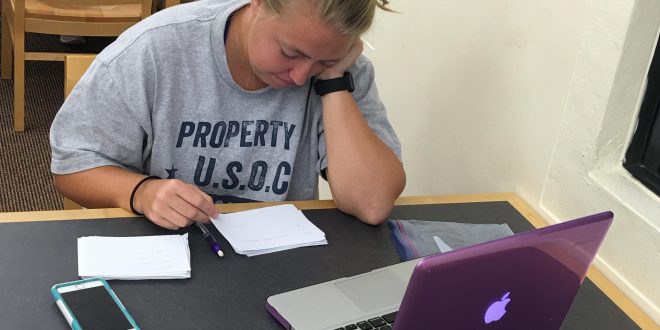Midterms can make or break a class for some students. Therefore it’s an important time during the semester. How does one student for their midterms? How does one not cave under the immense pressure of midterms? Here are some study tips that could possibly help win the battle with midterm:
Tip #1:
Read. Yes, what may seem trivial, boring and a waste of time will most likely help the most. According to Cengagebrain.com, they say that reading can help more than students think. They stated that, one might say that they’ll just skim the course material, and they should. Don’t spend the night before your biology midterm, trying to read every word of the 22 chapters that’ll be on the exam. Instead, read the chapter headings, chapter reviews, and study questions. Also read the course syllabus, if the professor has listed their tentative schedule, then those are the topics that they consider most important. Maybe putting a post-it note on some of the important information will help students remember. Skimming an hour or two before the exam could help students remember information quickly, instead of reading every chapter in detail, causing the confusion of, “What will be on the exam?”
Tip #2:
According to USAtoday.com, joining a study group is a beneficial way to study. Students should try to link up with other students and form a study group. Talking with other students can force the brain to remember information, and signal the information as being important. Although studying with a group of people will help, also studying outside of said group would help as well. Maybe studying alone a few days before the exam could reinforce the information, and make students see if they have retained any of the information. Changing the scenery with a study group can also help the brain relax, making it easier for the brain to be receptive to new material. Being apart of a study group can get some confusing questions answered. Sometimes having more than one head collaborating on a problem can create positive outcomes. Collaboration is not a bad thing. In college, everybody hates having to working in groups, so pick the group wisely, and choose to always be efficient.
Tip #3:
Don’t cram for your midterms. According to Cengagebrain.com, cramming is a recipe for disaster. They say that college students seem to think that anything can be done the night before, but that’s not the case. Students have to give themselves some time to actually try and learn/memorize the information. Trying to read several chapters and answering several study questions the night before will do nothing but frustrate the situation. Start studying a week or two before. Organize a schedule, and stick to it. Don’t create a situation that’s inescapable. Cramming is definitely a form of not being organized, and just good old-fashioned procrastination. Procrastination singlehandedly makes students question their schooling and where or not the courses they’re taking are for them. Study early, and be prepared. When students cram they don’t allow their brain to get time to retain information. During the exam students think that they should’ve remembered xyz, but they crammed 6 hours before and didn’t allow the brain to process the new information. Write a schedule, highlight the important information, and allow rest into the schedule. Write flash cards, and take them everywhere. This allows for idle time to be used in the best way possible.
Tip #4:
What’s one of the best stress reducers? Listening to music of course. Certain types of music have effects on what happens on each side of the brain. According to Patch.com, classical music is one of the genres that promote brain retention and great studying habits. My favorite classical composer would be Mozart or Bach. They have great piece of work that makes the studying process easier. Classical music causes my brain to focus on what’s in front of me, and helps it relax. While in the relaxation phase, I tend to actually remember a lot of information. Mozart and Bach may not be for every student there are hundreds of classical composers. Studying to music without lyrics is more helpful than listening to songs on the radio. When studying, taking in information requires absolute focus, so having lyrics playing could distract some students. Whereas strings, pianos, thunderstorm sounds, jungle sounds, beach sounds or any kind of tranquil relaxing music will help the study environment.
Tip #5:
In order to stay calm during midterms week, try exercising. Patch.com says that exercising causes the body to release endorphins of nervousness and creates positive emotions. When stressed it can seem like everything is off, or students can be irritable, but going to the gym will help with those feelings. Try meditating too. Meditation is a form of stress-relief that can takes the mind of off its current state and puts the brain into a healthier headspace. There are multiple ways to meditate, so if this is of interest to students, then they should find out the correct method for their own purposes. Students should also give pep talks to themselves throughout the week to help keep their own morale high. When morale is high, students tend to do their best and feel impossible. Remaining relaxed and calm can help students achieve heir goals for the week, and finding that inner relaxation is tailored to each student.
Midterms can be a stressful, scary place, but taking the right precautions can eliminate some of those emotions. While everyone has their own form of study techniques, and habits, gaining more habits might be conducive for some.
Good Luck on midterms VSU!
Story and Photo by Jacorey Moon, Staff Writer.
Feature image of Caitlyn Dawkins, Senior, Exercise Physiology.
For more Campus Life stories, click here.
 The Spectator The independent student newspaper of Valdosta State University
The Spectator The independent student newspaper of Valdosta State University







